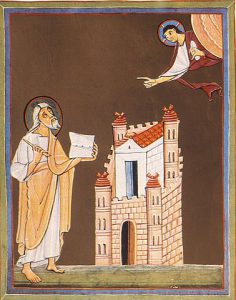 In light of the Ephesian church’s significant strengths (Rev. 2:2-3), it is surprising that she has allowed herself to slip into an area of weakness that could be her undoing. Revelation 2:4 says, “But I have this against you, that you have departed from your first love.” Interpreters struggle to interpret the “first love.” Although it appears to be so important to the letter, it is given little clarification. Those who want to tie it to the immediate context relate the first love to their testing of false apostles. According to this view, their testing of false teachers has led to divisions in the church and dampened their love for one another. The wider context points in a different direction. In Revelation 1-3, one finds three affirmations that Christ loves his people (1:5; 3:9, 19). In John’s writings, the people of Jesus believe in him and love him, while those who are not his people neither believe in him nor love him. More generically, the true children of God love God (John 8:42; 14:15, 21-24; 16:27; 1 John 2:5, 15; 4:20-21; 5:1-3). Now, it is also true that those who truly love Jesus will keep his commandments. His primary commandment is to love one another just as he has loved them (John 13:34-35; 15:12-13; 1 John 2:10; 3:10-14, 23; 4:7, 12, 19-21; 5:2; also Exod. 20:6). Notice the close connection between loving God and keeping his commandments in John 14:21-24 and 1 John 5:3. The Ephesian church would have been familiar with John’s teaching. They would have regarded love for Christ or God as the basic and foundational love, and God’s first commandment (Matt. 22:37-28; Deut. 6:5). If they love Christ, they must also love one another. Lack of love for one another reveals lack of love for Christ. Therefore, their “first love” is probably their love for Christ. If their love for Christ has diminished, then their love for one another would tend to diminish as well.
In light of the Ephesian church’s significant strengths (Rev. 2:2-3), it is surprising that she has allowed herself to slip into an area of weakness that could be her undoing. Revelation 2:4 says, “But I have this against you, that you have departed from your first love.” Interpreters struggle to interpret the “first love.” Although it appears to be so important to the letter, it is given little clarification. Those who want to tie it to the immediate context relate the first love to their testing of false apostles. According to this view, their testing of false teachers has led to divisions in the church and dampened their love for one another. The wider context points in a different direction. In Revelation 1-3, one finds three affirmations that Christ loves his people (1:5; 3:9, 19). In John’s writings, the people of Jesus believe in him and love him, while those who are not his people neither believe in him nor love him. More generically, the true children of God love God (John 8:42; 14:15, 21-24; 16:27; 1 John 2:5, 15; 4:20-21; 5:1-3). Now, it is also true that those who truly love Jesus will keep his commandments. His primary commandment is to love one another just as he has loved them (John 13:34-35; 15:12-13; 1 John 2:10; 3:10-14, 23; 4:7, 12, 19-21; 5:2; also Exod. 20:6). Notice the close connection between loving God and keeping his commandments in John 14:21-24 and 1 John 5:3. The Ephesian church would have been familiar with John’s teaching. They would have regarded love for Christ or God as the basic and foundational love, and God’s first commandment (Matt. 22:37-28; Deut. 6:5). If they love Christ, they must also love one another. Lack of love for one another reveals lack of love for Christ. Therefore, their “first love” is probably their love for Christ. If their love for Christ has diminished, then their love for one another would tend to diminish as well.
Two further observations from Revelation support the conclusion that love for Christ is primarily the “first love” of Revelation 2:4. First, the Ephesian church is part of Christ’s bride (Rev. 19:7-8). An essential aspect of being Christ’s bride would seem to be love for Christ. Second, Revelation reveals the continual temptations that the Beast and the Harlot employ to encourage the people of God to compromise in their faithfulness to Jesus, that is, in their obedience to his commands and the commands of his Father. The road of compromise is evident in the seven letters. Christ does not provide any details about what kind of compromises the Ephesian church is making. However, their departure from their first love suggests that they are making some compromises in their obedience to Christ, which reveal their diminished love for him.
The compromises must be significant, because they threaten to bring Christ’s decisive judgment upon their church. Revelation 2:5 says, “Remember, therefore, from where you have fallen and repent and do the works that you did at first. If not, I will come to you and I will remove your lampstand from its place, if you might not repent.”
Sources:
These paragraphs represent an edited portion of my book:
Paul Hoskins, The Book of Revelation: A Theological and Exegetical Commentary, pp. 74-75 (these pages provide further sources and footnotes that I have omitted above).